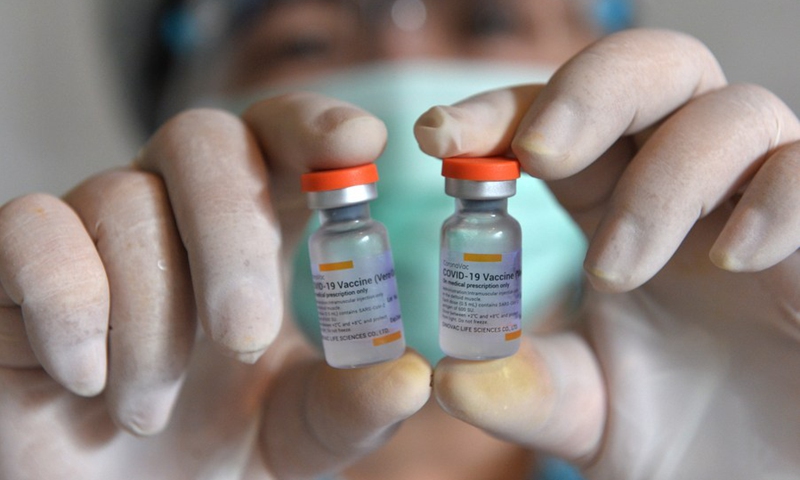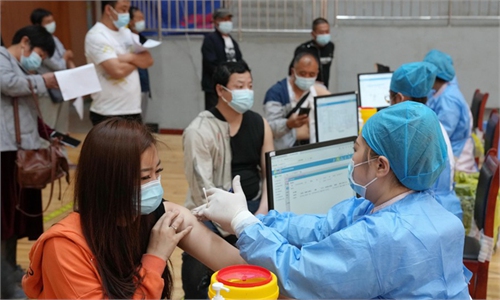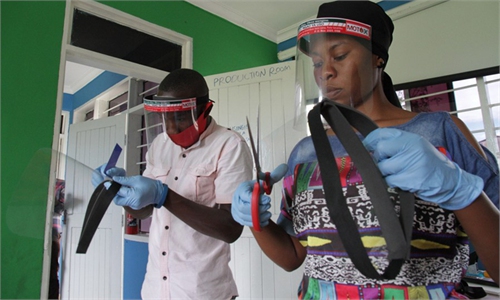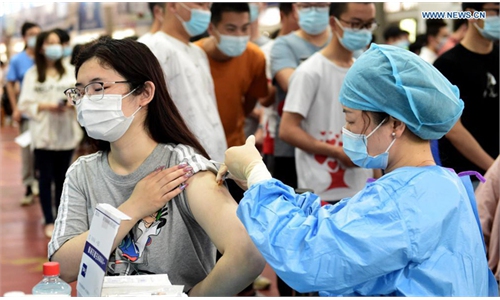
A health worker displays the COVID-19 vaccines developed by China's Sinovac. (Photo: Xinhua)
China is researching and developing 71 vaccines against COVID-19 and they are effective against the Delta strain, China's top epidemiologist Zhong Nanshan revealed over the weekend, making China the country with the largest number of vaccines undergoing research, experts said.Experts reached by the Global Times said if approved, those vaccines will satisfy urgent domestic and overseas demand as health authorities will gradually ramp up efforts to approve more vaccines. They will also provide a chance for the country to explore new technologies to develop vaccines against future infectious diseases that may be more severe than COVID-19.
Nine of the 71 vaccines have already been put into use. Two were granted World Health Organization (WHO) emergency use, Zhong said as he addressed the graduation ceremony at the Shanghai Tech University on Saturday. The WHO approved COVID-19 vaccines produced by China's Sinovac and Sinopharm for emergency use, reports said.
China's inactivated vaccines are effective in reducing the rate of infection and severe symptoms, and they are also effective against the Delta strain, he noted.
Feng Duojia, president of the China Vaccine Industry Association, told the Global Times on Sunday that having 71 vaccines in the process of research and development makes China the country with the largest number of vaccines in development across the globe. These vaccines, if approved, will meet domestic and foreign demand. They will also provide enough doses for the country if COVID-19 vaccines are to be given annually.
This large research pipeline provides a chance for China to study mature vaccine technologies, including mRNA technology and recombinant vaccine technology, and apply this knowledge to a possible future infectious disease more severe than COVID-19, Feng said. Those new technologies could also be used to optimize current vaccines against AIDs and the flu.
Zhong shared Guangzhou's experience with handling the recent flare-up that lasted more than 20 days. If Guangzhou had failed to control the virus, one epidemic model shows that it would have resulted in more than 7.3 million people getting infected within just 20 days, he said.
Given the fast transmission speed of Delta mutant strain, Guangzhou expanded the check scope of "close contacts" from the previous "same family, same office and same restaurant" to include people who live in the same space or building.
By using mobile phone location functions and public surveillance cameras, they were able to track down the close contacts of confirmed COVID-19 patients or those who had stayed in dangerous venues for more than one hour within a 250-meter radius. They were given "yellow" QR health codes and asked to take a nucleic acid test within 24 hours, according to Zhong.
Speaking of the opening of borders, Zhong said as long as the epidemic in one place is not completely under control, the world is still at stake. We need the joint effort of the whole world to fully control the pandemic.




